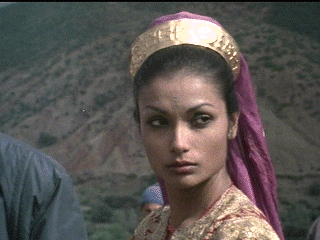How does one film The Great Gatsby?
With a great deal of care and reverence, I suppose.
Certainly, the Jack Clayton 1974 version – Hollywood’s third
attempt to depict arguably the greatest American novel ever written – is
filmmaking with the sort of attention to detail and seriousness usually
reserved for a religious ritual.
And yes, like most actual religious functions, this effort is
far too somber and particular to ever really entertain or convey anything like
sentiment. Adaptation is never an easy art to pull off, of course, and the old
adage that great books make lousy movies and lousy books make great movies is
never truer than it is here. Standout performances from Robert Redford and Mia
Farrow, both of whom seemed born to play Gatsby and Daisy, cannot save what one
critic quipped is a film “as lifeless as a body that’s been too long at the
bottom of a swimming pool.”
The strangeness of the failure is even more acute when one
realizes that both Francis Ford Coppola and Vladimir Nabakov – the latter no
slouch at writing novels – worked on the screenplay, a screenplay which on the
page, probably sang with passion. The scenes themselves, especially that first
grandiose party at Gatsby’s waterfront abode, also look spectacular enough to
get the heart pounding and the head hoping that what we are about to see will
equal the power and the pitfalls of the novel. But sadly the aesthetics and the
integrity of the plot are all that is on offer here. The movie just does not
hum along the way the book does and scenes that are meant to be emotional,
especially the tragic ones, play out flat and boring, as if conveyed by the
robotics of rote memorization.
That the book is far more complicated and less clean than
filmmakers and high school English teachers think no doubt also plays havoc on
this adaptation. For what is Fitzgerald after in the novel? Many would say it
is about money not being everything, an oblique reference to Fitzgerald’s “the
rich are not like you and me” quote, which is so often taken out of context as
to entirely lose its meaning. Certainly, Redford, with his shirts from Turbell
& Asher and his French champagne and fake Oxford degree is not like his
contemporaries, something both the novel and the film make clear once he is
dead and there is almost no one at his funeral, save Nick Carraway. But is the
book – and therefore, the film adaptation here – really so simple?
Certainly, I
did not think so the second time I read the novel, nor the third.
Rather than bore my handful of readers with literary
analysis, I will simply offer the following. Gatsby and Nick’s intertwined
searches for the self are entirely that: Searches for the self. Gatsby
attempted to remake himself because he never knew who he was in the first place
and was not sure what he wanted to become. This is the glory and the
rootlessness of egalitarian America, where you are not what your parents were
and are not confined by where you came from (unlike Europe, for example). You
must then invent yourself – and this
can take a lifetime, and even longer still, and the worst part of it is, you
may never reach a satisfactory result. Certainly, Gatsby did not.
Gatsby chooses Tom and Daisy’s crude and boorish model of
success as his lamppost because he wanted Daisy to be his and not Tom’s. What
he really wants is a past that he could not recapture and a future based on an
alternate past that never unfolded. He does not learn that you are not entirely
what others think of you. Worse, if you do not know yourself, truly know
yourself, then no party can ever be big enough,
no lie convincing enough.
Gatsby is a muddled, shook-up man who likely knows less about
himself at the end than he did at the beginning. Only Nick grows, but even he is paralyzed by
his own uncertainty about his own identity to do or say much throughout the
plot’s events, which is precisely why he is a great narrator, but near-awful
protagonist. He cannot break away from Tom and Daisy until it is too late and
he cannot help save Gatsby from himself. The plot itself is about a great many
things, wealth, discovery, the American dream, the hollowness of that dream,
relationships, love, nostalgia, maturation, lost innocence. I could go on,
because it is all there, and what we are dealing with is decisively deadly in
the way a tight Shakespearean tragedy is.
Funny thing about the old Bard, he does not film well,
either.
My suspicion is these texts matter too much to the people who
found some or all of the richness in them and that this affinity prevents these
adaptors from the level of interpretation and confinement necessary for two and
half hours of film. In that sense, The
Great Gatsby, is a beautiful but mediocre film, one that becomes interesting
only when we watch it for what it is not. In other words, no matter how earnest
the acolyte, he or she cannot conjure up the same magic as the prophet who
inspired them, and in the case of this film, what we have is a rather
unintentional examination of failing to achieve the sort of legitimate
greatness the title character himself vainly sought in the pages of a
century-old novel.











